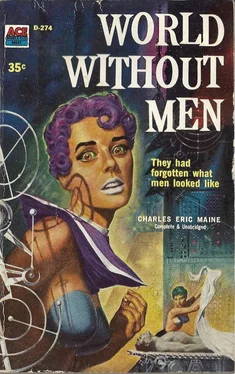Charles Maine - World Without Men
Здесь есть возможность читать онлайн «Charles Maine - World Without Men» весь текст электронной книги совершенно бесплатно (целиком полную версию без сокращений). В некоторых случаях можно слушать аудио, скачать через торрент в формате fb2 и присутствует краткое содержание. Город: New York, Год выпуска: 2013, Издательство: Ace Books, Жанр: Фантастика и фэнтези, на английском языке. Описание произведения, (предисловие) а так же отзывы посетителей доступны на портале библиотеки ЛибКат.
- Название:World Without Men
- Автор:
- Издательство:Ace Books
- Жанр:
- Год:2013
- Город:New York
- ISBN:нет данных
- Рейтинг книги:4 / 5. Голосов: 1
-
Избранное:Добавить в избранное
- Отзывы:
-
Ваша оценка:
- 80
- 1
- 2
- 3
- 4
- 5
World Without Men: краткое содержание, описание и аннотация
Предлагаем к чтению аннотацию, описание, краткое содержание или предисловие (зависит от того, что написал сам автор книги «World Without Men»). Если вы не нашли необходимую информацию о книге — напишите в комментариях, мы постараемся отыскать её.
World Without Men — читать онлайн бесплатно полную книгу (весь текст) целиком
Ниже представлен текст книги, разбитый по страницам. Система сохранения места последней прочитанной страницы, позволяет с удобством читать онлайн бесплатно книгу «World Without Men», без необходимости каждый раз заново искать на чём Вы остановились. Поставьте закладку, и сможете в любой момент перейти на страницу, на которой закончили чтение.
Интервал:
Закладка:
The fighter planes made a complete circle, closing in all the time. It was now possible to see the pilots silhouetted in their sealed control turrets; they looked black and sinister. The planes swept away in a wide ellipse, then came back again, and this time they were very close. Brad saw that they were painted jet black and bore no identification markings.
Uneasiness began to twist blindly in his abdomen. The fighters flashed past, reappearing after a few seconds on the other side, and then, as if in synchronism, turned and bore down on the jet liner. The delta wings flashed orange. Incan descent fingers struck rapidly through space. A moment later the jet liner was aflame throughout its length as incendiary rockets exploded within its fuselage.
In consternation Brad gripped the back of the pilot’s seat, paralysed beyond all thought or feeling. The aircraft shook with subdued thunder, and looking through the starboard window he saw that one wing was alight in brilliant amber flame that belched a streamer of dense black smoke behind it. The copilot struggled insanely with the controls, his face ashen.
It seemed to Brad that the ocean far below tilted slowly upwards until it blotted out the sky, and the throb of the jets was drowned by a new terrifying sound — a tearing, shrieking sound of air being tom apart by a plunging mass of metal. In the intensity of his personal horror he did not even hear the screams that filtered from the passenger compartment.
Seconds remained, and he knew it. No time to think — no time to plan — no time to do anything but stare in frantic disbelief at the immense green wall of water rushing upwards at incredible speed. But somewhere at the back of his mind he knew that he had lost the battle. They had achieved checkmate and won the game. The deaths of nearly a hundred other people, passengers and crew, were unimportant — they had destroyed him, Brad Somer, and had preserved their secret.
It was the beginning of the end, he realized; not for him self or the other terrified people in the aircraft, but for the whole human race! This plane contained death of freedom and the individual, and the birth of a new kind of despotism acting under the guise of security.
When the jet liner hit the ocean it was still travelling faster than sound. Nothing remained. Nothing.
Part Four
The Patriarch
XIII
On ms seventy-fifth birthday Old Gavor was presented with a massive birthday cake bearing seventy-five electronic candles. The candles were so triggered that, at the slightest puff of breath from Gavor’s feeble and wrinkled lips, they extinguished themselves automatically and in precise sequence, spelling out in dark ephemeral lines the words “Happy Birth day.” It was a welcome touch of sentiment in a world that had long abandoned any pretension to sentiment. It was a gimmick designed to keep the last man in a childishly-contented frame of mind, and Old Gavor knew it, but he didn’t care any more.
For most of the day he amused himself by blowing out the electronic candles over and over again; the novelty remained fresh with him until late in the evening. Then he began to tire, and with the fatigue came peevishness. He took a knife and attempted to cut the cake in half, but, of course, it was made from a polythene compound and inedible, and presently, frustrated and annoyed, he swept the thing from the table on to the luxuriously carpeted floor, where it flashed and sparked and sputtered for several seconds, then emitted blue smoke as it lay dead and distorted.
Sulkily he crossed to the door and pressed the fourth button down on the adjacent control panel. A green light winked merrily. He scowled irascibly, then returned to the polythene cake on the floor and kicked it viciously. It flashed and belched more smoke, then became inanimate.
A moment later the door opened and a young woman entered. She was dark and olive complexioned, with deep brown eyes in which sincerity seemed mingled with a hint of the sardonic. Her dress was brief, in a translucent green, and her legs (which were the principle focus of Old Gavor’s glazed eyes) were of satin pink.
She looked at the damaged polythene cake, then at the old man, and shook her head sorrowfully, but with a glint of humour in her eyes. “You’re a naughty boy, Gavor,” she said in mild reproof. “You could be reprimanded for this.”
She picked up the cake and replaced it on the table.
“I’m fed up,” Old Gavor complained in his reedy voice. “All you give me are toys to play with. I’m tired of toys. I want to get around, to see the world. I’m old enough, aren’t I?”
The girl smiled. “The world is a big place and it is full of women. You wouldn’t be safe.”
Old Gavor snorted. “I have been a prisoner in this building for more than a generation. I want freedom. I want my rights.”
“You haven’t any rights,” said the girl pleasantly. “You’re State property and we have to take good care of you.”
“I can take care of myself. I want to get out and walk the streets of London before I die.”
“The streets of London are crowded, and dangerous to an old man. You can see them on television.”
“Damn television! Damn you all. I’d rather die. I want to die. Tell your Mistress that.”
The girl took his arms and eased him gently into a chair. “Now you’re being antisocial. You still have a duty towards society. Remember, you are the last man. Once you are dead we no longer have a source of male gametes for our laboratory experiments.”
“I’m a guinea pig; that’s what I am.”
“Not at all, Gavor. Rather, let us say, you are a culture from which we can obtain certain unique micro-organisms that may help to save the world.”
Old Gavor spat angrily on the floor. “I don’t want to be a culture. I want to be let alone, to get around, to see things and people.”
“There are no people any more, only women. And don’t spit, it’s unhygienic.”
Old Gavor growled in his beard. The beard was quite unkempt, and covered his face like a miniature undergrowth, from which only his bright blue eyes and his long shiny nose peeped almost apologetically. Despite his age he was sprightly enough, but his sprightliness possessed a brittle, enfeebled quality which was reflected in the bony structure of his wrists and his skeletal hands. He was dressed conventionally in a suit of dark gray, shiny at the seat and elbows. New clothes were available to him at a snap of the fingers, but he preferred the untidy comfort of those he had worn for years.
“You’re like an old horse,” the girl explained, “set to graze in the twilight of its life. You’ve had your day and had your fun.”
The old man chuckled abruptly. “How many did I have? Ten thousand, twenty thousand…?”
“More. Nearly thirty thousand children in all, including those produced in incubators. And every one a girl.”
“Not bad, eh? And I’m not finished yet.”
“By no means. The incubators are still breeding your progeny. Who knows, one might be a boy. That would change the course of history.”
“I wasn’t thinking of incubators,” said Gavor scowling. “I meant like in the old days. Why don’t I have women to stay with me now?”
The girl smiled. “At seventy-five? Besides, it’s wasteful. We have more efficient methods.”
Old Gavor grunted in disgust. “Glass tubes and machinery. I don’t like it. Besides, I’m not so old as I look. Once in a while I’d like to…”
“I’ll speak to the Mistress about it, but it’s not quite so simple as you think. There have been changes in society during the past generation. Very few of the mature women of today remember men at all, and they accept the world of women as normal. Women are born into a matriarchy, and, if anything, they look upon men as obsolete freaks of nature.”
Читать дальшеИнтервал:
Закладка:
Похожие книги на «World Without Men»
Представляем Вашему вниманию похожие книги на «World Without Men» списком для выбора. Мы отобрали схожую по названию и смыслу литературу в надежде предоставить читателям больше вариантов отыскать новые, интересные, ещё непрочитанные произведения.
Обсуждение, отзывы о книге «World Without Men» и просто собственные мнения читателей. Оставьте ваши комментарии, напишите, что Вы думаете о произведении, его смысле или главных героях. Укажите что конкретно понравилось, а что нет, и почему Вы так считаете.












